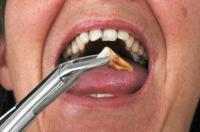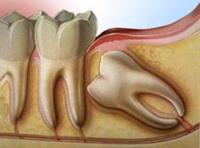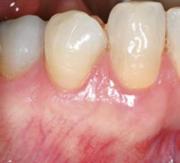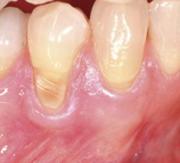Oral surgery
Oral Surgery
- Extraction
- Wisdom tooth extraction
- Abcess and cyst operations
- Soft and hard tissue grafts
- Hemisection
- İmplants
1. Extraction
 Which teeth are extracted?
Which teeth are extracted?
- Nontreatable and nonrestorable carious teeth
- Teeth with advanced periodontal disease
- Teeth with non treatable abcess and infections
- Teeth which orthodontically have to be removed
- Teeth that are malpositioned ,
- Teeth ot roots that are nonrepairable after big traumas
- Impacted teeth that haven’t erupted
- Milk teeth that did not fall on time
- Teeth that can not bed saved dispite root canal treatment are extracted
2. Wisdom Tooth Extraction
 As we all know last teeth that erupt are the third molars. Generally they erupt between 17 and 25 years of ages. It is still debatable whether or not to leave them in the mouth. If they erupt properly in the right position and do not cause any damage to surrounding tissues there is no disadvantage to levae them in the mouth. But teeth that are diagnosed radiographically to be impacted or malpositioned have to be extracted in case of any space limitations. The eruption of the wisdom tooth can be disturbed by neighbouring teeth, gum tissue or bone which makes the extraction more complex.
As we all know last teeth that erupt are the third molars. Generally they erupt between 17 and 25 years of ages. It is still debatable whether or not to leave them in the mouth. If they erupt properly in the right position and do not cause any damage to surrounding tissues there is no disadvantage to levae them in the mouth. But teeth that are diagnosed radiographically to be impacted or malpositioned have to be extracted in case of any space limitations. The eruption of the wisdom tooth can be disturbed by neighbouring teeth, gum tissue or bone which makes the extraction more complex.
What are the prerequisites for wisdom teeth extractions?
- DECAY: Plaque accumulation,food impaction causes at the eruption site decays threatining the wisdom teeth and the adjacent teeth. Those decays are hard to discover and treat. It may end up with severe sitations such as infections with abcess formation and severe pain.
- GUM INFLAMATİON(Pericoronit): The partially erupted wisdom tooth site mostly becomes an infection focus due to food and bacterial impaction. This leads to bad breath,pain,swelling and trismus (disability of opening the mouth) . The infection may spread through lymph system into cheeks and neck. If not treated this site is prone to recurrent infections.
- PRESSURE PAİN: During eruption the wisdom tooth may exercise pressure to adjacent teeth which may lead sometimes to their abrasions
- ORTHODONTIC FACTORS: Many young individuals undergo orthodontic treatments to fix their malocclusions or malpositionings of their teeth and jaws. The eruption forces of the wisdom teeth may influence the orthodontic treatment by causing unwanted movements of the teeth and making the crowding of the teeth worse.
- PROTHETİC FACTORS: When treatmentplanning a mouth one has to take the wisdom teeth into consideration.Since the removal of the wisdom teeth may affect the situation in the mouth and a new prothesis has to be fabricated ..
- CYST FORMATİON: In literature cysts caused by unerupted teeth have been witnessed. Cysts may cause bone resorptions,jaw enlargements,depositioning of the neighbouring teeth. In order to prevent bone resorptions the tooth has to be extracted and cyst has to be removed.Rarely the cyst may spread to larger areas may form tumors and cause fractions of the jaws.
Do wisdom teeth have to be extracted even without any reason?
Especially the lower wisdom teeth one day most probably may cause problems.Unexpectedly pain swellingor trismus may occur.So for that reason some researchers advocate the early removal of wisdom teeth before any problem arouses.
What has to be done before extractions?
If any medicine ( for example antibiotics) is prescribed it should be taken regularly, sticking to the time according to doctors instructions.If any allergy or illness that you are aware or if any drugs that you take regularly exists you have to inform your doctor in advance. Drugs that inhibit blood coagulation such as (aspirin) should not be taken.If possible mouth should be rinsed with antiseptic solutions and teeth have to be brushed in order to reduce the risk of secondary infections.
What precautions do we have to take after extractions?
- The compress has be kept on the extraction site for approximately 30 minutes
- If not needed after removal of the compress a new one has not to be applied
- Mouth rinses are not allowed to use
- At least two hours after extraction eating is prohibited.After 2 hours too hot and too cold are to be avoided .
- 24 hours smoking is not allowed.Smoking causes the coagulum to remove or the site to get inflamated .This situation is called the dry socket syndrome and causes longlasting pain.
- Alcohol consumption is prohibited for 24 hours
- Touching the extraction site or sucking and spitting out is not allowed.
- You better not use that side of the mouth for one day
- In case it is needed painkillers other than aspirin have to be taken by consulting with your doctor
- Extraction site has to be kept clean and food impaction has to be avoided
- 24 hours after the extraction with a soft toothbrush the site has to be brushed gently and salty water can be used as an adjunct therapy .
- A slight bleeding that may last 6 to 24 hours has to be considered normal
- If it is exeeded the doctor has to be contacted
- If the swelling or pain continues for alonger period of time it is wise to asc for the doctors advice
What has to be done after healing?
Depending on where the extraction site is a bridge,prothesis or implant is appicable. It should be kept in mind that that tooth loss can not only cause digestive problems but there may be tilting of adjacent teeth to the extraction site which ends up with disturbances of masticatory system as well.
3. Abcess and Cyst Operations (Apicoectomy)
What is the indication for Apicoectomy?

Apicoectomy is the surgical removal of the inflamated root tip. These are the indications for apicoectomies.
- In cases where the shape of the roots do not permit for a proper acsess for root canal treatment.
- In cases where root canal instruments are broken in the canal and the only way to get it out is the apical portion of the root.
- If there is a restoration on the tooth which can not be taken out and does not allow therefore for a root canal access.
- If there is a cyst at the root tip
- In cases where despite the root canal therapy the pain persist.
- In cases where the apical third of the root is broken
4. Soft and Hard Tissue Grafts
At peoples mouth who have lost one or multiple teeth resorbtion starts to be witnessed after some time of the extraction. Resorbtion can be defined as the loss of the bone. Resorbing bone and soft tissue following it may cause some unesthetic results such as depression in the frontal segment of the mouth after the teeth have been extracted or it may end up with deficent bone for implant placement or peridontal defects. Resorbed site can be treated with a couple of methods of grafting. For little defects demineralized freezed dried bone or other bone substitutes can be utilized whereas for larger defects grafts from one’s own body (autologous) can be used according to the size of the defect. This method has a greater chance for the bone has live cells.On the other hand it has to remembered that when using autologous grafts an second operation site is added nmely the donor site. for every case it is ideal to discuss the situation and the treatment modalities with your doctor.

In some cases thereis a deficiency in soft tissue for covering the the bone graft for full coverage and for promoting healing.In those situations soft tiissue grafts taken generally from back of the palate is harvested and grafted in place to gain more tissue.


5. Hemisection
At apical inflamations of multirooted teeth it is observed that one root is inflamated while the rest remain noninflamated. In those cases after a proper root canal treatment by asurgical prosedure the affected root is taken out and the healthy one is held in mouth.Later on a crown is made on that root.
6. İmplant Treatment
 Implants are artificial roots that are placed into jawbones to regain function an esthetics of the teeth lost. Implants are indicated at single tooth loss cases without touching the neighbouring teeth, at multiple tooth loss cases where instead ofremovable partial dentures fix bridges can be utilized or at edentulous cases replacing dentures with fix bridgework to regain function esthetis and phonetics.Phsyological resorbtions that arouse after trauma ot extractions cause volumetric changes of the jawbones which makes it diffucult for the patient to cope up with prothesis that lack function,esthetics and good phonetic values which makes it diffucult for the prothesis to fulfill its duty. Especially in those situations implants are a good treatment modality for the patient to enjoy life as he used to do.
Implants are artificial roots that are placed into jawbones to regain function an esthetics of the teeth lost. Implants are indicated at single tooth loss cases without touching the neighbouring teeth, at multiple tooth loss cases where instead ofremovable partial dentures fix bridges can be utilized or at edentulous cases replacing dentures with fix bridgework to regain function esthetis and phonetics.Phsyological resorbtions that arouse after trauma ot extractions cause volumetric changes of the jawbones which makes it diffucult for the patient to cope up with prothesis that lack function,esthetics and good phonetic values which makes it diffucult for the prothesis to fulfill its duty. Especially in those situations implants are a good treatment modality for the patient to enjoy life as he used to do.
